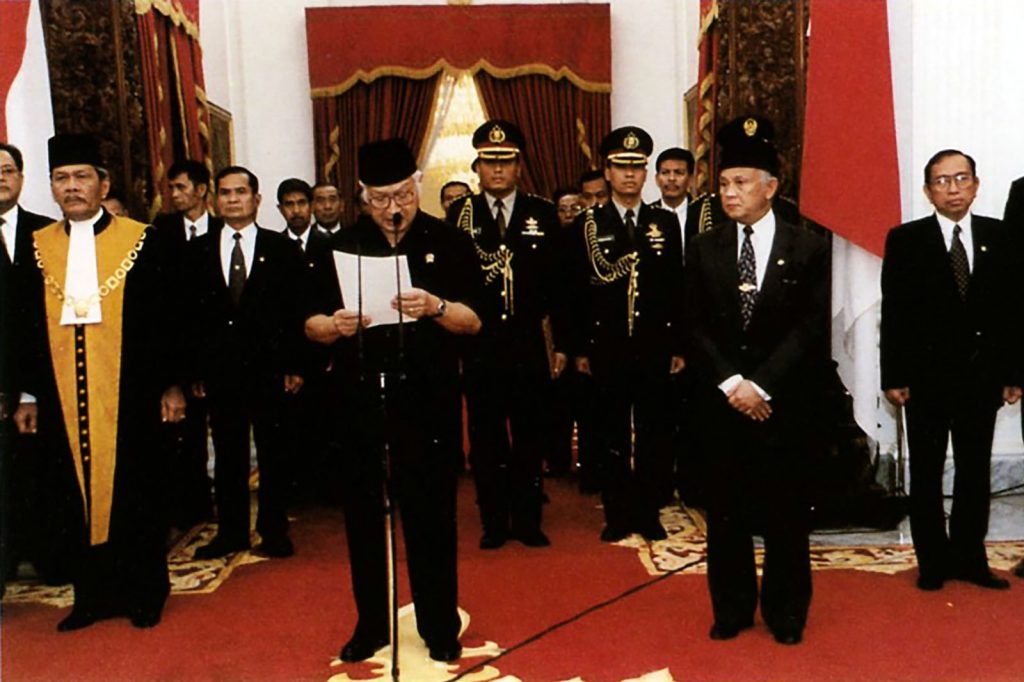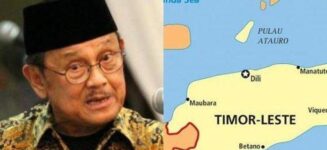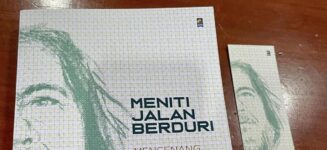Ahead of the 2019 presidential election both candidates, the incumbent President Joko “Jokowi” Widodo and his challenger Prabowo Subianto, may be moving toward some characteristics contrary to the sprit of the Reform Era, which put an end to Soeharto’s New Order regime in 1998.
These trends may be discerned in the three dimensions of the political predicament: the rise of conservative political Islam, the candidates’ human rights approach and the kind of democracy they rely on.
Political Islam has entered the mainstream and become even more pronounced with massive religious rallies in three consecutive years since late 2016. The sheer magnitude of the masses mobilized at the National Monument in the heart of the capital shocked the establishment, prompting both camps – populist as they are – Prabowo’s allies since 2014 and later Jokowi’s allies as well, to manipulate religious identity.
For the first time since the founding fathers of the republic, at its very birth in 1945, domesticated sharia aspirations through consensus, the republic now faces a similar, but greater challenge – albeit by a different configuration of actors and forces.
While the vanguard was held by the Islam Defenders Front (FPI) under popular ulema Rizieq Shihab, the masses are of a great mix of supporters of Islam-based political parties, mass organizations and common urbanites from across the archipelago, provoked by religious and ethnic sentiment, but also by mass evictions in Jakarta.
Given their intrinsic contradictions – among the FPI, the banned Hizbut Tahrir Indonesia (HTI), the Prosperous Justice Party (PKS) with its grassroots support and other Islamic groupings – it would be hard to unite them into a formidable political force.
For them, at this stage, democracy is simply an instrument to gain a majority in the legislative bodies and state institutions. They have thus transformed themselves from – to use Dutch sociologist WF Wertheim’s term – “a majority with minority mentality” into something like a big minority with majority-complex.
Long suppressed by Soeharto’s New Order, political Islam emerged from its shadows in the late 1990s when it gained momentum, only to continue gathering strength under Susilo Bambang Yudhoyono’s decade of presidency.
However, just as Jokowi’s administration succeeded in isolating Rizieq in Saudi Arabia and enforcing the Constitutional paradigm of “unity in diversity”, leading to political Islamists modifying or hiding their caliphate rhetoric, it has to face their continuing fierce campaign accusing the state of “criminalizing religious leaders”.
A series of reunions and ijtima (consultation) gatherings to organize campaigns for the Prabowo-led coalition and to choose its vice-presidential candidate were held in Jeddah and Jakarta late last year. The events revealed that the Islamic groups, now called “PA212” (brotherhood of 212 alumni), in a desperate attempt to cement some unity, not only lacked leadership but apparently plunged into disarray.
The FPI is also changing. Born in a dramatic time of change as a proxy of some generals in 1998, these racketeers have lost their raison d’etre and continue to depend on others to legitimize their role.
With the PKS in serious decline, the HTI banned and the FPI left without charismatic leadership on the ground, the Prabowo-Sandiaga Uno duo has successfully sidelined them as tactical allies while keeping their potentially huge electoral support.
This means current political Islam, lacking an oligarchic base of its own, could only enter the state apparatus by relying on Prabowo-Sandiaga networks.
The Jokowi camp, meanwhile, has been able to get some influential religious leaders on board, but his vice-presidential choice of Indonesian Ulema Council (MUI) chairman Ma’ruf Amin, a heavy-weight sectarian scholar, may have cost Jokowi some votes and possibly his credentials as national leader.
It remains to be seen to what extent Jokowi’s coalition of six political parties, underpinned by the greatest Muslim mass organization, the Nadhatul Ulama, and their oligarchic base, can consolidate its strength.
The question is what impact the Jokowi or Prabowo camp may have on victimized minorities and victims of past atrocities. Perhaps, little. None of the candidates have clarified their human rights perspective, but by the look of it neither side has escaped the New Order paradigmatic legacy.
President Jokowi has rightly claimed he is “clean” of KKN, the trademark of Soeharto-era corruption, collusion and nepotism.
Yet precisely because he is a little known-local petit bourgeoisie-turned-head of state untainted by the past regime – i.e. unfamiliar with the old guard establishment’s game and style – he may be either insensitive or prone to revive the very characteristics of the New Order.
Hence, the anomaly of having a popular but weak presidency in an electoral democracy.
Too often he remained silent, ignoring the required statesmanship when things grew worse and needed intervention like the persecution of Papuans, raids on “leftist” book events, blasphemy cases leading to the conviction and imprisonment of former Jakarta governor Basuki “Ahok” Tjahaja Purnama and of civilian Meliana. Then there was his (meanwhile canceled) intention to release Muslim extremist Abubakar Baasyir.
His administration’s plan to build a Bela Negara (state defense) corps and to recruit some 600 generals into civilian institutions reminds us of creeping militarization and the Army’s dual role.
Worse, his nine-points development agenda known as Nawa Cita lingers on: With regard to the resolution of human rights cases, the President simply quoted the Attorney General’s claim that “the 1965 case” was of a “far too distant past” to investigate.
It is as if the mass killings were petty crimes, the Buru Island prison camp never existed and all witnesses had vanished – as if the President advises the nation to forget the genocide.
Prabowo would most likely take a similar stance. No wonder both camps are supported by old-crack generals, including some tainted by serious human wrongs.
Political operations of both candidates depend on their respective oligarchic resources of big corporates facilitated by the New Order legacy. This has resulted in an electoral democracy based on oligarchic power, which controls the threshold that severely limits the participation of political parties and candidates in the presidential and legislative elections.
Unlike Jokowi, Prabowo’s coalition, now joined by Soeharto’s clan, has plainly proposed New Order-like policies. His campaign manager, retired general Djoko Santoso, proudly called for ignoring human rights whenever the state is being threatened.
Two sources have become standard bearers for the 1965-1966 atrocities: the report of the National Human Rights Commission (2014) and that of the International People’s Tribunal (2016).
Another report, entirely ignored, is Timor Leste’s five-volume Commission of Truth and Reconciliation (CAVR) Chega! Report (2013), which details Indonesia’s atrocities in former East Timor.
While Prabowo’s key role in the kidnapping of activists in 1997 is well known, Chega! indicates his hand in the killing of hundreds of unarmed civilians in the Kraras area, Viqueque, in 1983 – the greatest act of killing perpetrated by the Army since 1965.
All this signals a new era of hope and fear of changes that are to come after the April 17 showdown.



